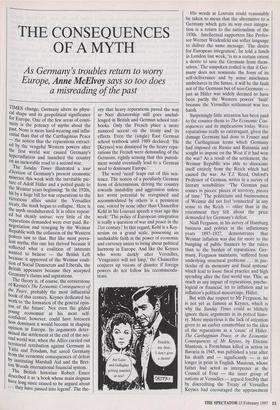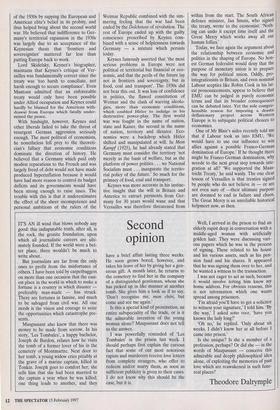THE CONSEQUENCES OF A MYTH
As Germany's troubles return to worry a misreading of the past
TIMES change, Germany alters its physi- cal shape and its geopolitical significance for Europe. One of the few areas of conti- nuity is the potency of myths about the past. None is more hard-wearing and influ- ential than that of the Carthaginian Peace — the notion that the reparations extract- ed by the vengeful Western powers after the first world war caused Germany's hyperinflation and launched the country on an inexorable road to a second war.
The Sunday Times illustrated a tour d'horizon of Germany's present economic miseries this week with the inevitable pic- ture of Adolf Hitler and a potted guide to the Weimar years beginning: 'In the 1920s, hit by a huge bill for war reparations to the victorious allies under the Versailles treaty, the mark began to collapse.' Here is the myth unadulterated. It is often repeat- ed but clearly untrue: very little of the reparations demanded were ever paid. Re- negotiation and reneging by the Weimar Republic with the collusion of the Western Powers saw to that. But like most preva- lent myths, this one has thrived because it reflected what a coalition of interests wanted to believe — the British Left because it approved of the Weimar coali- tion of Social Democrats and Liberals, the British appeasers because they accepted Germany's claims and aspirations. The theory is, of course, the cornerstone of Keynes's The Economic Consequences of the Peace, probably the most influential book of this century. Keynes dedicated his work to 'the formation of the general opin- ion of the future'. Not even the gilded young economist at his most self- confident, however, could have foreseen how dominant it would become in shaping opinion in Europe. Its arguments deter- mined the settlement at the end of the sec- ond world war, when the Allies carried out territorial retribution against Germany in Yalta and Potsdam, but saved Germany from the economic consequences of defeat by instituting Marshall Aid and the Bret- ton Woods international financial system. The British historian Robert Ensor described it as 'a book whose main dogmas have long since ceased to be argued about • • . they have passed into legend'. The the- ory that heavy reparations paved the way to Nazi dictatorship still goes unchal- lenged in British and German school text- books. Only the French place a more nuanced accent on the treaty and its effects. Even the (single) East German school textbook until 1989 declared: 'He [Keynes] was dismayed by the heavy repa- rations the French were demanding of the Germans, rightly sensing that this punish- ment would eventually lead to a German need to dominate Europe.'
The word 'need' leaps out of this sen- tence. The notion of a peculiarly German form of determinism, driving the country towards instability and aggression unless her worst potential be recognised and accommodated by others is a persistent one, voiced by none other than Chancellor Kohl in his Louvain speech a year ago this week: 'The policy of European integration is really a question of war and peace in the 21st century.' In this regard, Kohl is a Key- nesian on a grand scale, possessing an unshakable faith in the power of economic and currency union to bring about political harmony in Europe. And like the Keynes who wrote darkly after Versailles, `Vengeance will not limp,' the Chancellor conjures up visions of disaster if foreign powers do not follow his recommenda- tions. His words at Louvain could reasonably be taken to mean that the alternative to a Germany which gets its way over integra- tion is a return to the nationalism of the 1930s. Intellectual supporters like Profes- sor Werner Weidenfeld use softer language to deliver the same message: 'The desire for European integration', he told a lunch in London last week, 'is to a certain extent a desire to save the Germans from them- selves.' The unspoken codicil is that if Ger- many does not nominate the form of its self-deliverance and by some mischance misbehaves in the future, it will be the fault not of the Germans but of non-Germans just as Hitler was widely deemed to have been partly the Western powers' fault' because the Versailles settlement was too harsh.
Surprisingly little attention has been paid to the counter-thesis to The Economic Con- sequences and its implications today. Were reparations really so extravagant, given the damage Germany had done to France and the Carthaginian terms which Germany had imposed on Russia and Rumania and sought to impose on the West if it had won the war? As a result of the settlement, the Weimar Republic was able to dissociate itself entirely from the Reich which had caused the war. As T.J. Reed, Oxford's Professor of German, writes in a survey of literary sensibilities: 'The German past comes in pieces: pieces of territory, pieces of time.' The politicians and businessmen of Weimar did not feel 'connected' in any sense to the Reich — other than in the resentment they felt about the price demanded for Germany's defeat.
Niall Ferguson, in his survey of Hamburg business and politics in the inflationary years 1897-1927, demonstrates that Weimar inflation was due far more to the bungling of public finances by the rulers than to the burden of reparations. Ger- many, Ferguson maintains, 'suffered from underlying structural problems . . . in par- ticular of its monetary and fiscal systems' which lead to loose fiscal practice and high spending after the first world war. This, as much as any impact of reparations, psycho- logical or financial, let to inflation and to inflation's political miscarriage, Hitler.
But with due respect to Mr Ferguson, he is not yet as famous as Keynes, which is why the Sunday Times could so blithely ignore these arguments in its potted histo- ry. More mysterious is the lack of attention given to an earlier counterblast to the idea of the reparations as a 'cause' of Hitler. The Carthaginian Peace, or the Economic Consequences of Mr Keynes, by Etienne Mantoux, a Frenchman killed in action in Bavaria in 1945, was published a year after his death and — significantly — is no longer in print in English. Mantoux, whose father had acted as interpreter at the Council of Four — the inner group of nations at Versailles — argued forcibly that by discrediting the Treaty of Versailles Keynes had encouraged the appeasement of the 1930s by sapping the European and American elite's belief in its probity, and thus helped bring about the second world war. He believed that indifference to Ger- many's territorial expansion in the 1930s was largely due to an acceptance of the Keynesian thesis that 'frontiers and sovereignties' mattered far less than putting Europe back to work.
Lord Skidelsky, Keynes's biographer, maintains that Keynes's critique of Ver- sailles was fundamentally correct since the treaty was `too harsh to conciliate, not harsh enough to secure compliance'. Even Mantoux admitted that an enforceable treaty would only have been possible under Allied occupation and Keynes could hardly be blamed for the American with- drawal from Europe which fatally under- mined the peace.
With hindsight, however, Keynes and other liberals failed to take the threat of resurgent German aggression seriously enough. The most political of economists, he nonetheless fell prey to the theoreti- cian's fallacy that economic conditions dominate the direction of history. He believed that a Germany which paid only modest reparations to the French and was largely freed of debt would not have made produced hyperinflation because it would have had more reason to control its budget deficits and its governments would have been strong enough to raise taxes. The trouble with this is that it underestimates the effect of the sheer incompetence and personal ambitions of the rulers of the Weimar Republic combined with the sim- mering feeling that the war had been ended by the Dolchstoss of revolution. The rest of Europe ended up with the guilty conscience prescribed by Keynes com- bined with a sense of helplessness towards Germany — a mixture which persists today.
Keynes famously asserted that 'the most serious problems in Europe were not political or territorial but financial or eco- nomic, and that the perils of the future lay not in frontiers and sovereignty, but in food, coal and transport'. The 1930s did not bear this out. It was loss of confidence in politics, the flawed constitution of Weimar and the clash of warring ideolo- gies, more than economic conditions, which enabled Hitler to indulge in his destructive power-play. The first world war was fought in the name of nation, state and Kaiser, the second in the name of nation, territory and dictator. Eco- nomics were a backdrop which Hitler shifted and manipulated at will. In Mein Kampf (1925), he had already stated that Germany must consider the territory 'not merely as the basis of welfare, but as the platform of power politics . . . we National Socialists must . . . inaugurate the territo- rial policy of the future.' So much for the primacy of food, coal and transport.
Keynes was more accurate in his instinc- tive insight that the will in Britain and America to extract payments. from Ger- many for 30 years would wane and that Versailles was therefore threatened from within from the start. The South African defence minister, Jan Smuts, who signed the treaty, wrote to the economist: 'Noth- ing can undo it except time itself and the Great Mercy which works away all our human follies.'
Today, we face again the argument about the relationship between economic and politics in the shaping of Europe. No hon- est German federalist would deny that the purpose of monetary union is to prepare the way for political union. Oddly, pro- integrationists in Britain, and even nominal Labour sceptics like Robin Cook in his lat- est pronouncements, appear to believe that EMU can be judged in purely economic terms and that its broader consequences can be debated later. Yet the sole compre- hensible reason for imposing a drastic deflationary project across Western Europe is to subjugate political choices to economics.
One of Mr Blair's aides recently told me that if Labour took us into EMU, 'We would have to use our influence to win allies against a possible Franco-German domination of Europe.' If he thought there might be Franco-German domination, why accede to the next great step towards inte- gration at all? 'We supported the Maas- tricht Treaty,' he said wanly. The one clear lesson of Versailles is that treaties signed by people who do not believe in — or are not even sure of —their ultimate purpose are doomed to end in failure and chaos. The Great Mercy is an unreliable historical helpmeet now, as then.



























































 Previous page
Previous page